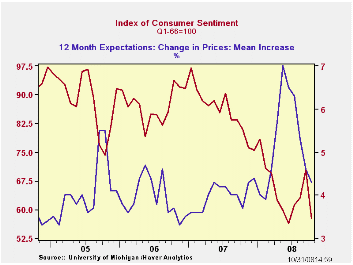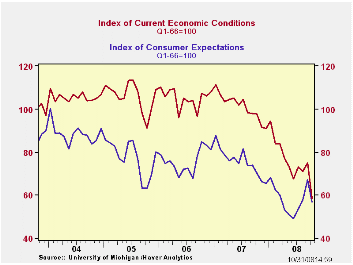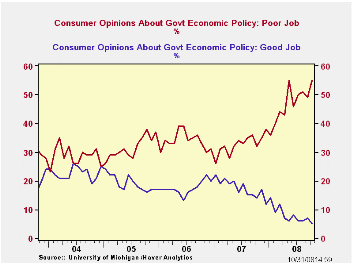 Global| Oct 31 2008
Global| Oct 31 2008Michigan Consumer Sentiment Collapsed With The Stock Market & The Opinion of Gov't
by:Tom Moeller
|in:Economy in Brief
Summary
The University of Michigan's October reading of consumer sentiment collapsed by 18.1% from the September level, to 57.6. That was very much the same as reported at mid-month and the latest level was the lowest for the series since [...]

The University of Michigan's October reading of consumer sentiment collapsed by 18.1% from the September level, to 57.6. That was very much the same as reported at mid-month and the latest level was the lowest for the series since June which in turn was the lowest since early-1980. The drop was a record m/m decline for the index which dates back to the late 1970s. The full-month figure matched Consensus expectations.
During the last ten years there has been a 55% correlation between the level of sentiment and the three-month change in real consumer spending.
The opinion of government policy, which apparently influences economic expectations, fell sharply from September (-39.0% y/y) but it was slightly better than the mid-month read. Only five percent of respondents thought that a good job was being done by government while 55% thought a poor job was being done. That was the highest percentage on record.
As reported at mid-month, the current conditions index led the collapse with 22.1% decline. The view of current personal finances gave back all of a September improvement with a m/m decline of one-third. The index of buying conditions for large household goods fell 16.8% m/m to the lowest level since 1980, down 37.3% y/y.
The expectations component of consumer sentiment aided the m/m decline in the total with a 15.6% drop. Expectations for business conditions during the next years collapsed by 24.6%, as reported at mid-month. Expectations for conditions during the next five years fell 14.5% but they remained well up from their historic lows.The expected change in personal finances fell 11.7%.
The mean expected rate of inflation during the next year slipped to 4.3% with lower oil prices, down from the mid-month expectation. It was as high as 7.0% in May but the expectation was still above prior years. The expected inflation rate during the next five years fell to 3.1%, the lowest level since 2003.
The University of Michigan survey is not seasonally adjusted.The reading is based on telephone interviews with about 500 households at month-end; the mid-month results are based on about 300 interviews. The summary indexes are in Haver's USECON database, with details in the proprietary UMSCA database.
What Is Liquidity Risk? from the Federal Reserve Bank of San Francisco and it can be found here.
Monetary Policy Transparency and Private Sector Forecasts: Evidence from Survey Data from the Federal Reserve Bank of Kansa City is available here.
| University of Michigan | October | Mid-October | September | October y/y | 2007 | 2006 | 2005 |
|---|---|---|---|---|---|---|---|
| Consumer Sentiment | 57.6 | 57.5 | 70.3 | -28.8% | 85.6 | 87.3 | 88.5 |
| Current Conditions | 58.4 | 58.9 | 75.0 | -40.2 | 101.2 | 105.1 | 105.9 |
| Expectations | 57.0 | 56.7 | 67.2 | -18.7 | 75.6 | 75.9 | 77.4 |
Tom Moeller
AuthorMore in Author Profile »Prior to joining Haver Analytics in 2000, Mr. Moeller worked as the Economist at Chancellor Capital Management from 1985 to 1999. There, he developed comprehensive economic forecasts and interpreted economic data for equity and fixed income portfolio managers. Also at Chancellor, Mr. Moeller worked as an equity analyst and was responsible for researching and rating companies in the economically sensitive automobile and housing industries for investment in Chancellor’s equity portfolio. Prior to joining Chancellor, Mr. Moeller was an Economist at Citibank from 1979 to 1984. He also analyzed pricing behavior in the metals industry for the Council on Wage and Price Stability in Washington, D.C. In 1999, Mr. Moeller received the award for most accurate forecast from the Forecasters' Club of New York. From 1990 to 1992 he was President of the New York Association for Business Economists. Mr. Moeller earned an M.B.A. in Finance from Fordham University, where he graduated in 1987. He holds a Bachelor of Arts in Economics from George Washington University.






